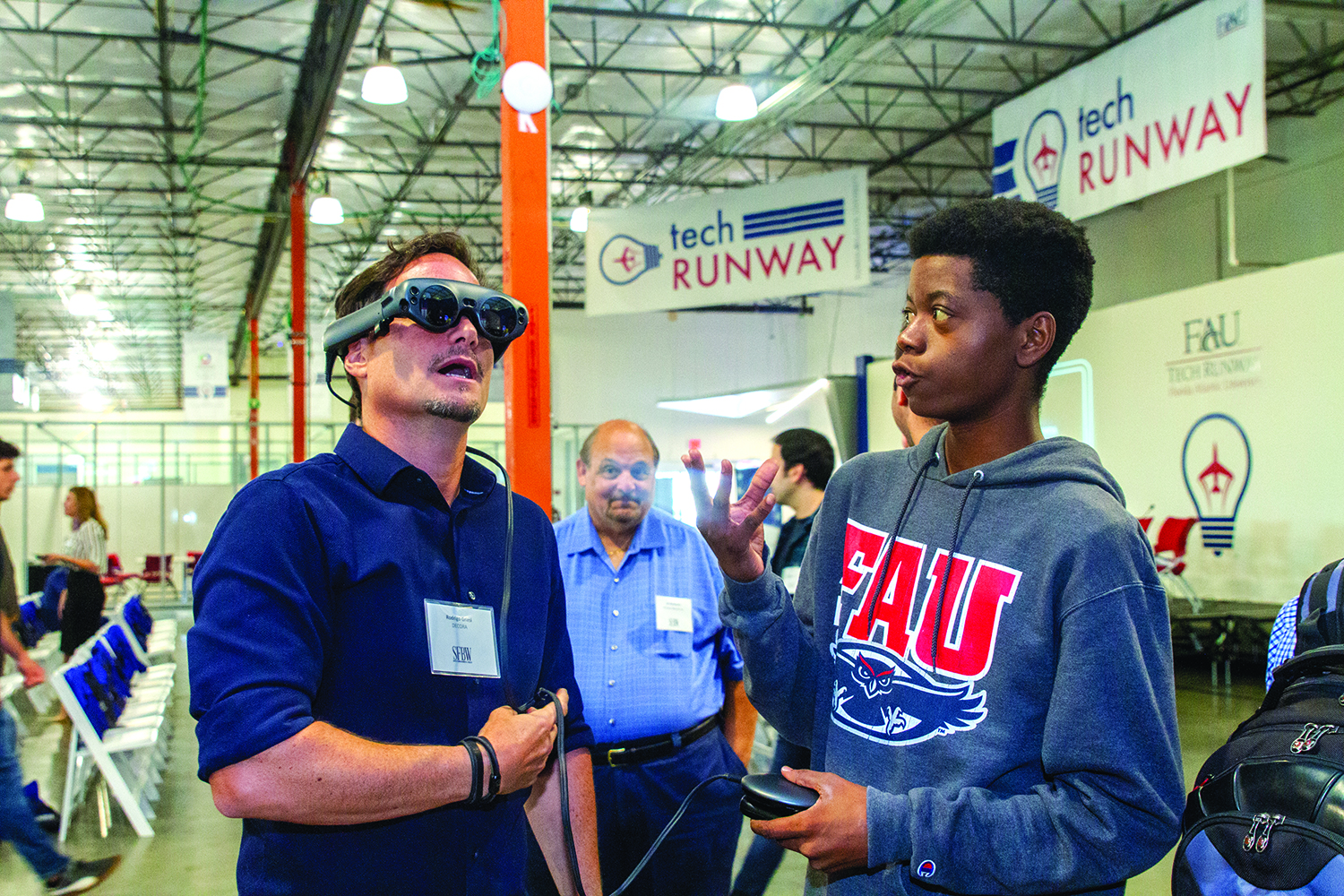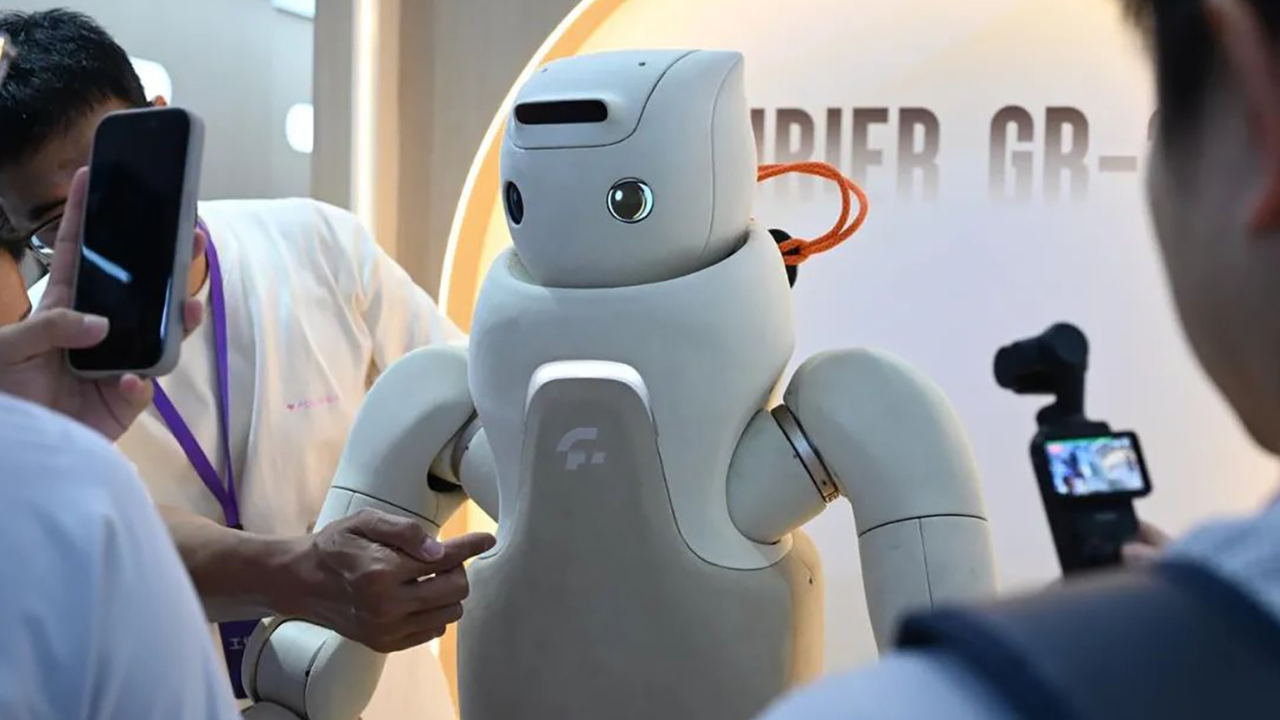[vc_row css_animation=”” row_type=”row” use_row_as_full_screen_section=”no” type=”full_width” angled_section=”no” text_align=”left” background_image_as_pattern=”without_pattern”][vc_column width=”2/3″][vc_column_text]
Photos by Evelyn Suarez
Augmented reality and virtual reality will be a rising tide rather than a tidal wave that swamps businesses, said panelists at SFBW’s Digital South Florida event. It might be time for your business to consider modest experiments as test pilots.
The Digital South Florida event at Florida Atlantic University’s Tech Runway, presented by Levatas, included demonstrations of VR and AR, including drone flights with augmented reality bubbles and a demonstration of an array of images in Magic Leap One, the AR system by the Plantation company.
Tech Runway is an FAU accelerator and incubator that helps bring new technologies and ideas to the market. Other tech companies make their home in FAU’s research park. Companies don’t have to be affiliated from the university to seek advice from the Small Business Development Center at FAU
Rhys Williams, associate vice president and managing director of FAU Tech Runway, was the moderator for the panel discussion.
Here are some of the key topics, edited for clarity and brevity.
The Panelists
The panelists were:
• Chris Nielsen, founder of Levatas, which specializes in computer vision technology to help clients understand, design and deploy artificial intelligence solutions.
• William Hahn, CEO at Voxel Rx, which is developing deep-learning tools to understand Alzheimer’s disease, co-director at the Machine Perception and Cognitive Robotics Laboratory at Florida Atlantic University and professor in the FAU mathematics department.
• Rodrigo Griesi, Decora U.S. director at CreativeDrive. Boca Raton-based Decora produces computer-generated 3D images for major retailers and was acquired in 2018 by New York-based CreativeDrive for more than $100 million.
• Robert Kennedy, founder of Daruma Tech, which provides custom digital tools that include mobile, user experience, Microsoft technology, the cloud, application development and business intelligence. A recent project was an AR scavenger hunt with the Museum of Discovery and Science in Fort Lauderdale.
Key Phrases
Artificial Intelligence: Gives machines the ability to learn from experience as they take in more data and perform tasks like humans. Computers with these advanced technologies are trained to complete human-like tasks by processing data and recognizing the patterns within it. Apple’s Siri and Amazon’s Alexa are examples.
Augmented Reality: Uses technology to overlay digital information on an image of something being viewed through a device (such as a smartphone camera). The “Pokemon Go” app is an example, and Magic Leap of Plantation is developing the technology at a refined level. With AR, a computer-generated image is superimposed upon your view of the real world, providing a composite (and enhanced) view.
Virtual Reality: Immersive, computer-generated simulations of 3D images or environments. Users can interact by using special equipment, such as a helmet with a screen or gloves with sensors. Systems include Facebook’s Oculus.
Why you should care about VR?
Hahn: VR will get people out of the little box you carry in your hand. Everything you do is behind that window. And all day long, either on the mouse or with our thumbs, we’re just sort of trying to breathe through a straw to interact. I think the real potential with AR and VR is to bring that computer world into the real world where it’s in front of us, so we can interact with it.
Huge potential for education
Kennedy: We’ve had some success with AR and primarily in a couple areas. One is education. We’ve had tremendous success working with FAU and the STEM [science, technology, engineering and mathematics] program down in Broward County. The students are super excited about both AR and VR. The 3D modeling and animation definitely gets them all excited and enthused. They really liked that when they’re done, they have something they can show their friends and family, which is nice. And they can do that quickly. To build something that’s cinematic quality, they quickly learned there’s a lot of man hours, a lot of patience and a lot of artistry that goes into it.
Nielsen: I think the highest-value societal benefit is actually experiential learning, interactive learning. Think of it as the new school textbook, if you will, when those resources are available to our kids—the opportunities for left-brain learning and right-brain learning.
Hahn: I think we need to treat AI like literacy. Every student that comes to campus, they take an English class. We don’t expect every student to be Shakespeare, but they have to have some concept of what it means to create writing. Every human on the planet now basically uses software, so we need to have students aware of how this works.
A rising tide
Nielsen: To a degree, we see AR and VR as well as artificial intelligence, somewhat as a tide. We don’t see it as a tidal wave that’s coming to crash upon the markets all at once. It’s little by little.
Griesi: Daruma was founded in Brazil and was acquired last year not because of its AR products itself, but because of whatever we brought together through our clients. Those big retailers are seeing the tide rise, but it doesn’t pay off yet. But we also create imagery that is flat-rendered [two dimensional]. I can get this on any device, and this really lifts their sales. Because we do everything in 3D from the start, we ended up having the 3D assets through the process. We saw our clients getting interested in building a library of 3D assets. So, for example, Home Depot has 2,000 different chairs and we are modeling the chairs for them. Our company got the interest of another company in New York, because they were photography, and we are CGI [computer generated images]. So, we’re technology that complements their services in terms of photography. And that’s where we’ve created value. Whoever has the more assets, the 3Ds as I would call the models, will be far ahead of the competition.
Kennedy: We have a brewery that was trying to move from Brazil into the U.S. market and we did an AR set of coasters. We built an app that explained about their beer. The other area that we would love to see more of is cultural heritage. You take something like the Vizcaya Museum and Gardens—at some point in the near future, that will only be visible in 3D in a VR experience, or AR. It’s going to crumble and it’s going to fall into the sea and that’s going to be the end of it—the barge [a mooring structure at Vizcaya] being probably the first victim. It’s basically falling apart.
AR for repairs
Nielsen: Something we’re seeing in the field today, which is actionable, is repair where there’s complex machinery, complex process, complex systems at play. We’re seeing augmented reality primarily being used in cost reduction. If you own a huge statewide utility, which one of our of our clients does, you have a lot of complex electrical equipment. You can reduce costs by sending the less-senior technicians into the field, wearing augmented reality headsets. When they run into a problem that would normally require a very expensive senior technician, they can bring them in, then they can see the files of how to fix it.
Use of mixed reality
Hahn: That’s when you have something that’s actually in the real world that has something that’s interactive about it. So, you might have a coaster that actually exists in the real world. And then when you’re looking through the goggles or through your phone, whatever your platform is, you’re going to get all this new content. You might get promotions. You might get links to coupons. You might get social media upgrades, or all kinds of things like that. I think there’s a huge potential with branding, clothing and hats and all that.
Insights for health care
Hahn: Imagine if you’re a dermatologist, and now you’re wearing this headset and you now have an overlay of all of the surfaces telling you which areas are at risk for melanoma, and what subtypes of melanoma they might be. Nurses don’t know all the different types of melanoma—that takes years to study—but the headset can have an idea of what that is.
The role of blockchain
Hahn: Blockchain is going to work integrally with this AI. AI is not really going to be possible without blockchain, keeping us safe. The AI is sort of the brain and blockchains are sort of the immune system. It’s going to protect us from the robocalls and the spam that’s generated from AI and sort of notify things if it’s fake imagery. I think this is really going to be impactful in the augmented reality space.
Computer vision
Nielsen: There’s computer vision, sometimes called machine vision, also categorized under the term visual AI. That’s literally our focus at our firm. Think of it as the software or the brain behind augmented reality. They go hand in hand.
Hahn: Imagine you’re in one of these wizard video games and it’s put you in some world. You’re going to want to go up and talk to those people in that world, or the characters in that world, and you want them to have some sort of intelligent conversations. That’s another reason why you’re going to have to have intelligence behind augmented reality. ♦
About digital south florida
SFBW’s Digital South Florida series is an exclusive, invitation-only quarterly event that brings together South Florida’s top business leaders to meet and mingle.
The Presenting Sponsor is Levatas, and our Gold Sponsors are FAU Tech Runway, FAU Division of Research, The Florida SBDC at FAU, Cherry Bekaert, CPAs & Advisors, Third Level and TechLauderdale. The evening begins with a cocktail reception for about 100 guests followed by the highlight of the event, a panel discussion with well-known C-level executives who provide insight into their personal lives, careers and views on issues affecting digital transformation in the business community.
Partnering with SFBW on this exclusive event provides an opportunity to network with the area’s business elite, generate new business opportunities, and increase brand awareness. For information about event sponsorship opportunities, email Clayton Idle at cidle@sfbwmag.com.
[/vc_column_text][/vc_column][vc_column width=”1/3″][vc_gallery interval=”3″ images=”33371,33370,33369,33367,33366,33365,33364″ img_size=”full”][/vc_column][/vc_row]














